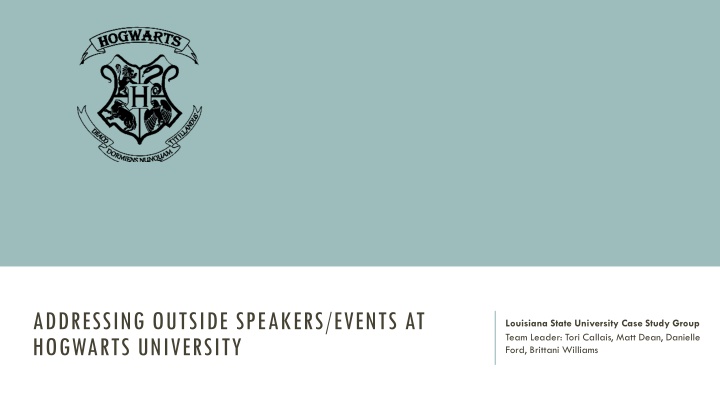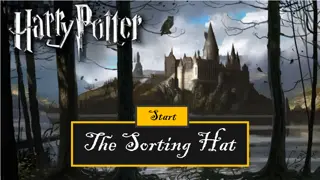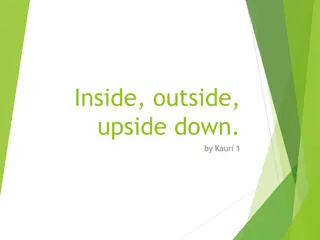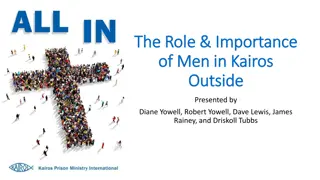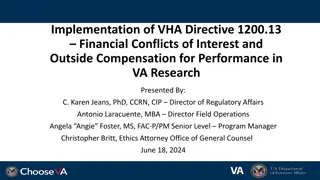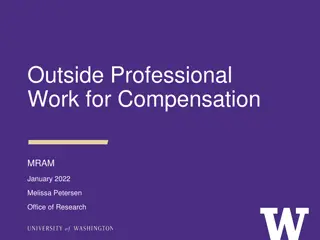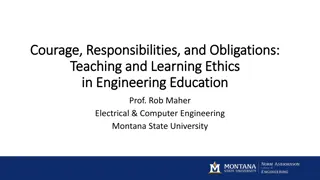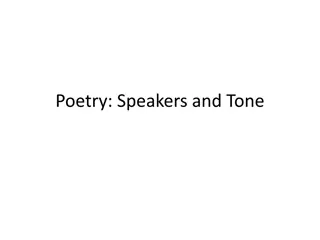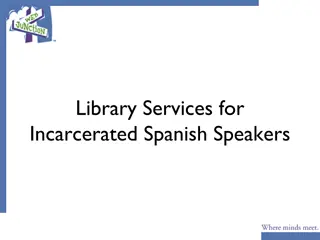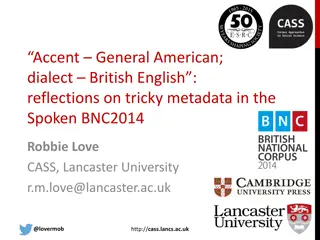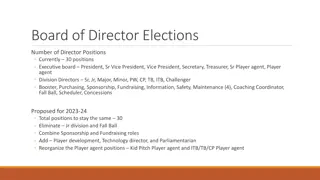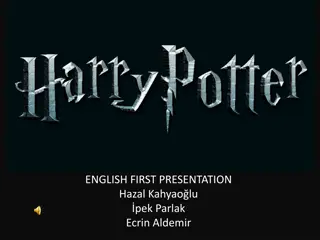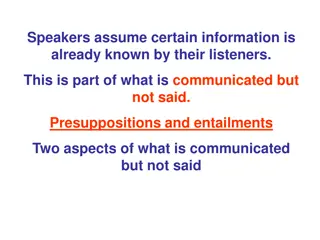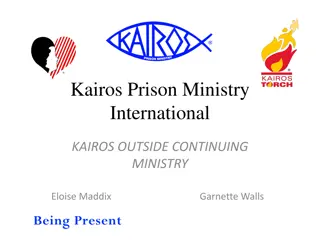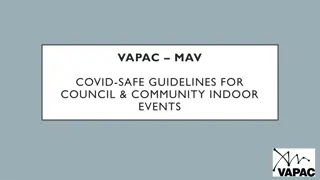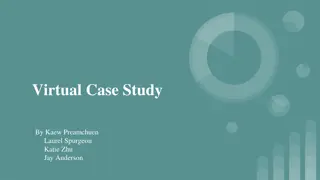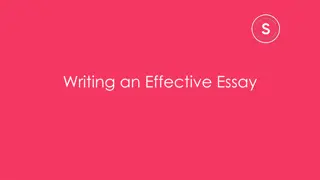Addressing Outside Speakers & Events at Hogwarts University - Proposed Guidelines and Responsibilities
Comparison between existing and proposed guidelines for addressing outside speakers and events at Hogwarts University, focusing on guidelines for students, student organizations, university leadership, faculty, and staff. Emphasis on protecting First Amendment rights while ensuring safety and responsibility in hosting non-University affiliated speakers.
Download Presentation

Please find below an Image/Link to download the presentation.
The content on the website is provided AS IS for your information and personal use only. It may not be sold, licensed, or shared on other websites without obtaining consent from the author.If you encounter any issues during the download, it is possible that the publisher has removed the file from their server.
You are allowed to download the files provided on this website for personal or commercial use, subject to the condition that they are used lawfully. All files are the property of their respective owners.
The content on the website is provided AS IS for your information and personal use only. It may not be sold, licensed, or shared on other websites without obtaining consent from the author.
E N D
Presentation Transcript
ADDRESSING OUTSIDE SPEAKERS/EVENTS AT HOGWARTS UNIVERSITY Louisiana State University Case Study Group Team Leader: Tori Callais, Matt Dean, Danielle Ford, Brittani Williams
OVERVIEW 1. Comparison of what exists and the proposed guidelines 2. Guidelines for Students and Student Organizations 3. Guidelines for University Leadership 4. Guidelines for Faculty and Staff
Proposed Guidelines Current Guidelines Train leadership, faculty, and staff on 1stamendment rights of students Register every student organization event with the Office of Student Organizations Campus Emergency Plan( How to Respond) for if an event creates a safety concern Preapproval may be requested without clear guidelines as to how content is selected Policy for what spaces on campus allow unscheduled public speaking areas Must reserve space ahead of time Preapproval process for all student organizations events with specific guidelines to how to reserve a space, how to reserve security, etc. Must advertise for individual events Promote free exchange of ideas for the campus community in general as long as they do not: interfere with a spaces normal/primary use, conflict with scheduled uses of the space, delay traffic (pedestrian, vehicle), interfere with normal routine/activities. (Defending individual rights in HE, n.d.) ** Current guidelines do not specifically outline procedure for outside speakers and events, very broad and unclear**
GUIDELINES FOR STUDENTS AND STUDENT ORGANIZATIONS
RIGHTS & RESPONSIBILITIES FOR HU STUDENTS & STUDENT ORGANIZATIONS Hogwarts University is steadfastly committed to protecting First Amendment rights to Free Speech and Freedom of Expression. As guaranteed by the Constitution, students [do not] shed their constitutional rights to freedom of speech or expression at the schoolhouse gate . However, First Amendment rights are not absolute. Speech can be limited if it involves substantial disorder or invasion of the rights of others .
The views of non-University affiliated speakers are in no way endorsed by the University. Invitations to speak at HU give no allowance for unlawful or illegal conduct. Certain types of speech are not protected; speakers who use forms of unprotected speech will not be allowed to continue. Students, student organizations, and guests must comply with requests from campus police and other campus officials. Failure to comply may result in disciplinary action. Students and student organizations who invite non-University affiliated speakers to campus are hosts of said speakers and are responsible for their conduct.
EXAMPLES OF UNPROTECTED SPEECH Obscenity Fighting Words and True Threats of Violence Incitement of Disruption or Illegal Activity to Breach the Peace Defamation
DISSENT Students may dissent peacefully, but if the dissent interferes with the speaker s right to speak and the audience s right to listen, and/or causes or threatens imminent harm, HU campus police and other university officials may remove the dissenters from the event. Peaceful dissent may include: Picketing or distributing literature outside the event as long as it does not block access to the event Silent or symbolic protest (such as wearing clothing, gesturing, or standing) is allowed as long as it does not interfere with the audience s ability to listen or see the speaker Chanting or making other noise is not allowed as it impedes the speaker s ability to speak and audience s ability to listen Engaging in violent or physical acts is never permitted.
OFFICE OF STUDENT ORGANIZATIONS GUIDELINES FOR INVITING NON-UNIVERSITY AFFILIATED SPEAKERS TO CAMPUS Registered Student Organizations ( RSOs ) shall submit an event proposal and University approved contract, which is required for all on-campus events sponsored by a RSO to the OSO. This shall be submitted no later than ten (10) business days before the event. Security may be required to provide a safe environment for the HU community. OSO will determine if security is required. The hosting RSO shall be responsible for any and all security costs and will be required to contact HU campus police to arrange security. In all advertisements and communications, the RSO is required to add the following disclaimer: Hogwarts University is committed to providing a safe and secure environment that encourages free expression of thoughts, ideas, and opinions. The use of HU property by any guest or group does not imply or constitute endorsement of said guest or group s views.
GUIDELINES FOR UNIVERSITY LEADERSHIP POSITIONS
ROLE OF UNIVERSITY LEADERSHIP In today s environment, universities be proactive in tackling issues of free speech and campus climate. Leaders are responsible for: Setting and implementing the institution s policies and procedures in regards to Freedom of Speech issues, Creating a comprehensive policy statement that clearly articulates the university s stance on free speech, Conducting risk management and campus climate assessments, Developing a detailed emergency management plan.
EMERGENCY MANAGEMENT PLAN A well conceived emergency management plan should: Be based on risk management, campus climate assessment, peer institution research, Detail chain of command and procedures for what to do if a campus security issue occurs, Be developed in advance and well disseminated throughout proper organizational channels in order to address risk management concerns and to coordinate a unified response by the university, Involve all levels of the institution, as well as include any necessary (state/local) governmental actors along with university administration, faculty, staff, and students, Be updated regularly to account for changes in both laws and universities structures. .
LEADERSHIP RESPONSE TO AN EVENT/SPEAKER Should an unforeseen problematic event/speaker arise, a coherent press release, drafted in conjunction with legal counsel, should be swiftly released in order to address any concerns and reiterate the position of the institution. All staff and faculty should be well-trained to direct any questions to appropriate media relations office. While university leadership should make every attempt to accommodate free speech, every event or speaker should be evaluated on an individual basis in regards to campus climate and safety. A cost-benefit analysis should be used by leadership to decide if not allowing a controversial event or speaker on campus is more inline with the mission of the university and beneficial to the institution s reputation in the court of public opinion than the risk of a potential first amendment based law suit.
FACULTY & STAFF CAMPUS CLIMATE PRESERVATION INITIATIVE (CCPI)
CCPI OVERVIEW The school s interest are often to preserve operations without disruption and maintain campus safety, as well as to prevent interference with the rights of its students (Responding to Campus Protests, 2014) The Office of Student Organizations stakeholders must relay to the campus our commitment to the free exchange of ideas and responsibility to protect health and safety of the students and preserve the institution s educational mission (Responding to Campus Protests, 2014) It is the position of faculty and staff (also referred to as stakeholders) of this department to support and protect the students while ensuring that their rights are exercised. Elected response team members will be instructed by to facilitate the CCPI
CCPI STAKEHOLDER BEST PRACTICES/IMPLEMENTATION Speakers/Protesters Notify speaker(s)/protester(s) of speech protections under the first amendment and any legal limitations It is ok for the office to utilized off campus resources, such as local police officers as security Notification Inform students of support within 24 hours of controversial speaker/disruptive protest (Quick Response) Campus Climate Notify campus police of the situation to assess campus conditions Assess Poll campus climate with survey before the speaker/protest is scheduled and also within 7 days of controversial speaker
CCPI PROBLEM-SOLVING STRATEGIES What Happens When Best Practices Aren t Enough? Coordinate extended service hours with campus mental health clinic Provide students with a list of laws that could be violated during acts of protect or controversial speakers. It is not about limiting students rights, but informing them of the legal ramifications ahead of time so they can plan accordingly.
IN CONCLUSION This committee hopes to guide our university to have a more holistic approach when it comes to outside speakers/events. The safety of our campus community is always our priority, while also encouraging free exchange of ideas. It is our hopes that these proposed guidelines will not only inform students or their rights, but also our professionals who work with students.
REFERENCES Alexander, K. W., & Alexander, K. (2017). Higher education law: policy and perspectives. New York: Routledge. Defending individual rights in higher education. (n.d.). Retrieved February 5, 2018, from https://www.thefire.org/ Event Scheduling and Protest Guidelines. (n.d.). Retrieved February 5, 2018, from http://www.studentaffairs.pitt.edu/wp-content/uploads/2016/11/Event-Scheduling-and-Protest- Guidelines_11_2016.pdf Kaplin, W. A., & Lee, B. A. (2014). The Law of Higher Education. John Wiley & Sons. Responding to Campus Protests: A Practitioner Resource -- LEGAL LINKS Connecting Student Affairs and Law Vol 1 Issue 2; 2014 EDUCATION LAW ASSOCIATION A Joint Publication with the Education Law Association & the NASPA Research and Policy Institute Tinker v. Des Moines Indep. Community School Dist., 393 U.S. 503, 506 (1969).
MEET THE AUTHORS Team Leader: Tori Callais vcalla1@lsu.edu Matt Dean mdean16@lsu.edu Danielle Ford dford23@lsu.edu Brittani Williams brittaniw@lsu.edu
